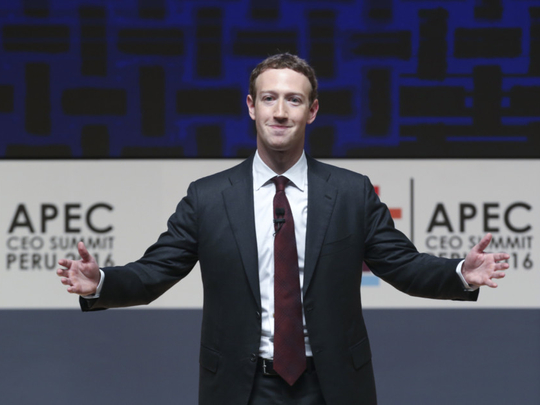
When 13 tech bosses, among them some of the world’s richest entrepreneurs, were summoned for a meeting with United States President-elect Donald Trump, one face was conspicuous by its absence. Facebook’s role in the US election had been much scrutinised: It was accused of being a Petri dish for fake news that allowed anti-Hillary Clinton stories to spread like wildfire; and the social network was employed to great effect by the Trump campaign, which built up profiles of voters to target and bombarded them with ads. And yet, Mark Zuckerberg was nowhere to be seen at Trump Tower. Instead, he sent his trusted deputy and chief operating officer, Sheryl Sandberg, making Facebook the only company at the meeting without its CEO in attendance. Zuckerberg has not explained his absence, but two likely, and related, reasons may well become clear.
Firstly, the man who started Facebook 13 years ago now has priorities outside its daily running: As with many tech founders, he would prefer the nitty gritty of advertising relationships and regulatory tangles to be dealt with by someone else, as Zuckerberg focuses on his missions — the $45 billion (Dh165.51 billion) fund he has set up with his wife Priscilla Chan, or the internet.org project to bring connectivity to the world’s poor.
But more fundamentally, Zuckerberg may see a photo-opportunity with the president-elect as harming his own political ambitions, especially if he plans to act on them sooner rather than later.
If your main impression of Facebook’s founder came through seeing The Social Network, you might find the film’s portrayal of Zuckerberg as an awkward Machiavellian schemer, a little difficult to square with the idea of a role in public office. But in recent years, he has been spring cleaning his image.
Connecting directly to the world via his own Facebook page, Zuckerberg is now the family man, the internationalist and the statesman (his profile is full of images documenting meetings with Indian Prime Minister Narendra Modi, officials in Beijing and Pope Francis).
Like many of his Silicon Valley brethren, he is a natural liberal, lobbying on immigration and science research, but Zuckerberg has been careful to appeal to a wider base.
In response to allegations that Facebook suppressed conservative news, he fired the team responsible and replaced them with supposedly bias-free algorithms. He has declined to take the immediate action that many liberals demanded on Facebook’s fake news problem. He has come out as religious after years of claiming atheism, a move that a cynic could point to as practically mandatory for high office. And most recently, he announced his ambition to visit every state in the US in order to understand the effect of globalisation.
“We need to find a way to change the game so it works for everyone,” he said. But if you’re still not convinced, the proof of Zuckerberg’s political ambitions lies in leaked conversations between Facebook board members over how to get shareholders to approve a corporate shake-up that would see him retain control of the company even after selling almost all his shares.
According to Bloomberg, the billionaire wanted to be able to serve two years in government without having to sell his stake.
If Zuckerberg’s ambitions are almost certain, the remaining question is why? He is one of the richest men in the world, and after all, his position at Facebook gives him more influence than most politicians.
But Silicon Valley has a tendency to believe it can fix everything that doesn’t run with ruthless efficiency. Whether it’s Apple’s moves into health care and education, Google’s attempts to fix transport or Facebook’s own Get Out The Vote operation, there are few arenas the billionaires who occupy a small enclave of California don’t believe can be solved with transparency, data and artificial intelligence. A system that propelled Trump (who is loathed in The Valley) to power may be seen as the ultimate call to action. After all, a lack of experience is no longer much of an obstacle to a life in public office.
To date, the politics of the super-rich tech elite has been expressed in terms of philanthropy — both Zuckerberg and Microsoft’s Bill Gates are giving away almost all their money to good causes — but it could soon become more direct. Not that this should ever be seen as a good idea — the consensus is that tech’s utopian leaders would make terrible officials — but try telling them that.
— The Telegraph Group Limited, London, 2017
James Titcomb is technology news editor with the Telegraph









